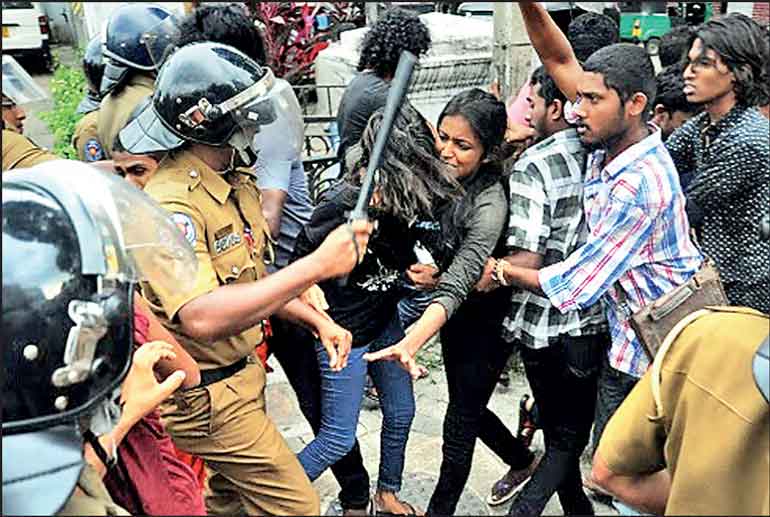Wednesday Feb 18, 2026
Wednesday Feb 18, 2026
Thursday, 11 April 2024 00:20 - - {{hitsCtrl.values.hits}}

Amnesty Interna-tional in a new investigative report released on Tuesday said Sri Lankan law enforcement officials engaged in the violent repression of protests must be held accountable for committing widespread human rights violations.
The report, ‘Ready to suppress any protest’ Sri Lanka: Unlawful use of weapons during protests’, analyses the use of force during policing of 30 protests that took place in Sri Lanka between March 2022 and June 2023. Amnesty International’s research shows a pattern in the unlawful use of tear gas and water cannon and the misuse of batons by Sri Lankan law enforcement officials with video evidence revealing that in at least 17 protests – more than half of those analysed – the conduct of law enforcement officials fell well short of international law and standards on the use of force.
“From the outset, the Sri Lankan police approached the 2022-23 protests assuming that they would be unlawful and violent and that they would need to use force to repress them. The police failed to recognize that people have the right to peacefully protest, and that the authorities have a duty to facilitate and protect protests. Instead, they targeted, chased, and beat largely peaceful protesters,” said Smriti Singh, Amnesty International’s Regional Director for South Asia.
During 2022 and 2023, Sri Lankans called for accountability for the prolonged economic crisis, corruption and human rights violations, in large-scale protests and an occupy movement known as the Aragalaya in Colombo and other cities across Sri Lanka. Amnesty International has documented unlawful use of force against largely peaceful protests that continue to date, including in 2024.
Meanwhile, in the Northern and Eastern provinces of the country, security forces and intelligence agencies regularly carry out surveillance, intimidation, harassment, and obstruction of largely peaceful protests that have continued to take place since 2017 by the relatives of people forcibly disappeared during the internal armed conflict in Sri Lanka.
During its investigation, Amnesty International conducted 39 qualitative interviews and an open-source investigation into 95 verified videos gathered on social media of 30 protests, predominantly from Colombo, Battaramulla, Kelaniya, Jaffna and Galle. In March 2024, Amnesty International wrote to the Sri Lanka Police outlining the allegations in this report and requesting an official response but had not received a reply at the time of publication.
Despite widespread human rights violations by law enforcement agencies and security forces, not a single police officer or member of the army has been prosecuted or convicted for the unlawful use of force during protests in 2022 and 2023. This lack of accountability exists within the context of a wider culture of impunity, where police and military personnel have rarely been held accountable for human rights violations; it also emboldens law enforcement officials to continue violently suppressing protests.
The Sri Lankan state is responsible under international law to investigate effectively, impartially, and in a timely manner, any allegation or reasonable suspicion of human rights violations by law enforcement officials. If the investigations find sufficient credible evidence, those suspected of criminal responsibility must be brought to justice in fair trials before ordinary civilian courts. This applies to those with responsibility at all levels, including senior officers.
“The brute force approach to policing of protests does not comply with international law and standards and restricts the right to freedom of peaceful assembly in Sri Lanka which is guaranteed under the International Covenant on Civil and Political Rights (ICCPR), to which Sri Lanka is a state party. The authorities must therefore urgently investigate all credible allegations of unlawful use of force by police during the 2022-23 protests as a failure to do so would in itself be a violation of human rights,” said Smriti Singh.